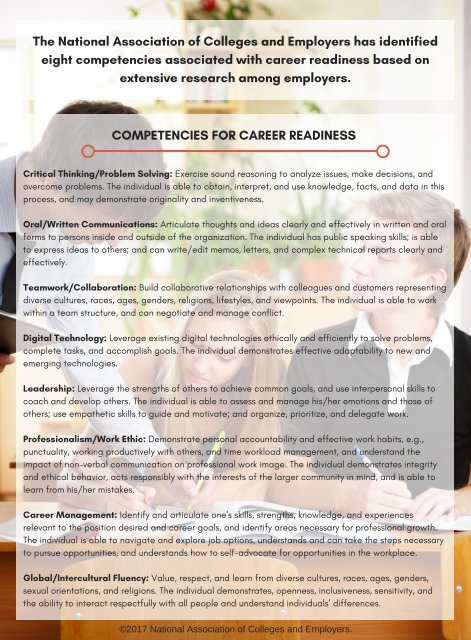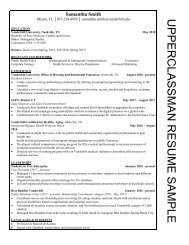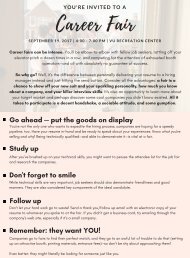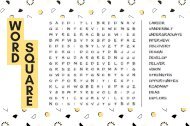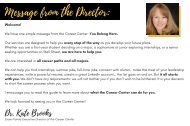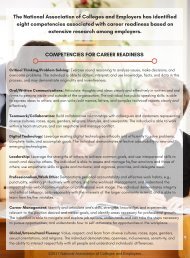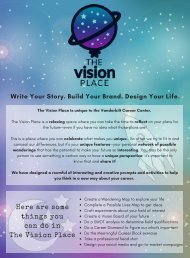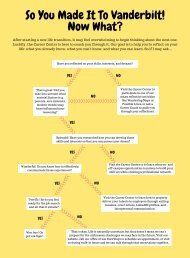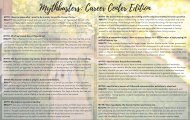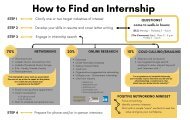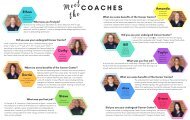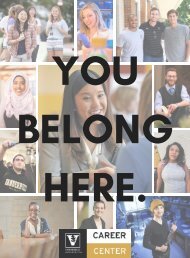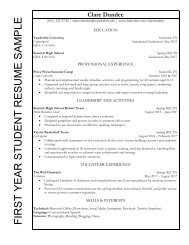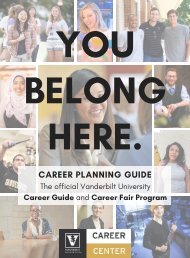2017 Career Planning Guide
You also want an ePaper? Increase the reach of your titles
YUMPU automatically turns print PDFs into web optimized ePapers that Google loves.
National Association of Colleges and Employers has identified<br />
The<br />
competencies associated with career readiness based on<br />
eight<br />
extensive research among employers.<br />
COMPETENCIES FOR CAREER READINESS<br />
Thinking/Problem Solving: Exercise sound reasoning to analyze issues, make decisions, and<br />
Critical<br />
problems. The individual is able to obtain, interpret, and use knowledge, facts, and data in this<br />
overcome<br />
process, and may demonstrate originality and inventiveness.<br />
Communications: Articulate thoughts and ideas clearly and effectively in written and oral<br />
Oral/Written<br />
to persons inside and outside of the organization. The individual has public speaking skills; is able<br />
forms<br />
to express ideas to others; and can write/edit memos, letters, and complex technical reports clearly and<br />
effectively.<br />
Build collaborative relationships with colleagues and customers representing<br />
Teamwork/Collaboration:<br />
cultures, races, ages, genders, religions, lifestyles, and viewpoints. The individual is able to work<br />
diverse<br />
within a team structure, and can negotiate and manage conflict.<br />
Technology: Leverage existing digital technologies ethically and efficiently to solve problems,<br />
Digital<br />
tasks, and accomplish goals. The individual demonstrates effective adaptability to new and<br />
complete<br />
emerging technologies.<br />
Leverage the strengths of others to achieve common goals, and use interpersonal skills to<br />
Leadership:<br />
and develop others. The individual is able to assess and manage his/her emotions and those of<br />
coach<br />
others; use empathetic skills to guide and motivate; and organize, prioritize, and delegate work.<br />
Ethic: Demonstrate personal accountability and effective work habits, e.g.,<br />
Professionalism/Work<br />
working productively with others, and time workload management, and understand the<br />
punctuality,<br />
impact of non-verbal communication on professional work image. The individual demonstrates integrity<br />
and ethical behavior, acts responsibly with the interests of the larger community in mind, and is able to<br />
learn from his/her mistakes.<br />
Management: Identify and articulate one's skills, strengths, knowledge, and experiences<br />
<strong>Career</strong><br />
to the position desired and career goals, and identify areas necessary for professional growth.<br />
relevant<br />
The individual is able to navigate and explore job options, understands and can take the steps necessary<br />
to pursue opportunities, and understands how to self-advocate for opportunities in the workplace.<br />
Fluency: Value, respect, and learn from diverse cultures, races, ages, genders,<br />
Global/Intercultural<br />
orientations, and religions. The individual demonstrates, openness, inclusiveness, sensitivity, and<br />
sexual<br />
the ability to interact respectfully with all people and understand individuals’ differences.<br />
©<strong>2017</strong> National Association of Colleges and Employers.


